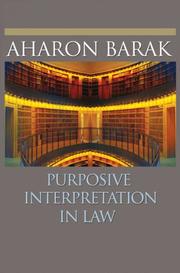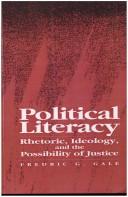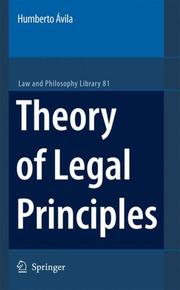| Listing 1 - 10 of 24 | << page >> |
Sort by
|
Book
ISBN: 1280533684 9786610533688 0198023200 0195356926 9780198023203 Year: 1995 Publisher: New York ; Oxford : Oxford University Press,
Abstract | Keywords | Export | Availability | Bookmark
 Loading...
Loading...Choose an application
- Reference Manager
- EndNote
- RefWorks (Direct export to RefWorks)
In modern times the idea of the objectivity of law has been undermined by skepticism about legal institutions, disbelief in ideals of unbiased evaluation, and a conviction that language is indeterminate. Greenawalt here considers the validity of such skepticism, examining such questions as: whether the law as it exists provides determinate answers to legal problems; whether the law should treat people in an ""objective way,"" according to abstract rules, general categories, and external consequences; and how far the law is anchored in something external to itself, such as social morality, poli
Law --- Objectivity. --- Knowledge, Theory of --- Reality --- Personal equation --- Analogy (Law) --- Construction and interpretation (Law) --- Construction and interpretation of statutes --- Interpretation and construction (Law) --- Statutes --- Statutory construction --- Judicial discretion --- Judicial process --- Legal certainty --- Interpretation and construction. --- Construction --- Interpretation and construction
Book
ISBN: 8490318158 9788490318157 9788490317556 8490317550 Year: 2013 Publisher: Madrid : Dykinson,
Abstract | Keywords | Export | Availability | Bookmark
 Loading...
Loading...Choose an application
- Reference Manager
- EndNote
- RefWorks (Direct export to RefWorks)
Law --- Derecho --- Analogy (Law) --- Construction and interpretation (Law) --- Construction and interpretation of statutes --- Interpretation and construction (Law) --- Statutes --- Statutory construction --- Judicial discretion --- Judicial process --- Legal certainty --- Interpretation and construction. --- Interpretación. --- Construction --- Interpretation and construction
Book
ISBN: 1316839907 1316840042 1316227324 1316840182 1316840743 1316840328 1107106958 1107514533 1316839060 9781316840740 9781316840320 9781107106956 9781316227329 9781107514539 Year: 2017 Publisher: Cambridge
Abstract | Keywords | Export | Availability | Bookmark
 Loading...
Loading...Choose an application
- Reference Manager
- EndNote
- RefWorks (Direct export to RefWorks)
This book is unique in presenting an interdisciplinary conversation between jurists and logicians. It brings together scholars from both law and philosophy and looks at the application of 'the new logics' to law and legal ordering, in a number of legal systems. The first Part explores the ways in which the new logics shed light on the functioning of legal orders, including the structure of legal argumentation and the rules of evidence. The second addresses how non-classical logics can help us to understand the interactions between multiple legal orders, in a range of contexts including domestic and international law. The final Part examines particular issues in the applicability of non-classical logics to legal reasoning. This book will be of interest to jurisprudence and logic scholars and students who want to deepen their understanding of relationships between law and legal reasoning, and learn about recent developments in formal logic.
Law --- Legal reasoning --- Analogy (Law) --- Construction and interpretation (Law) --- Construction and interpretation of statutes --- Interpretation and construction (Law) --- Statutes --- Statutory construction --- Judicial discretion --- Judicial process --- Legal certainty --- Interpretation and construction. --- Methodology. --- Construction --- Interpretation and construction

ISBN: 9780691133744 0691120072 0691133743 9786613291004 1283291002 1400841267 9781400841264 9780691120072 9781283291002 6613291005 Year: 2005 Publisher: Princeton, N.J. Princeton University Press
Abstract | Keywords | Export | Availability | Bookmark
 Loading...
Loading...Choose an application
- Reference Manager
- EndNote
- RefWorks (Direct export to RefWorks)
This book presents a comprehensive theory of legal interpretation, by a leading judge and legal theorist. Currently, legal philosophers and jurists apply different theories of interpretation to constitutions, statutes, rules, wills, and contracts. Aharon Barak argues that an alternative approach--purposive interpretation--allows jurists and scholars to approach all legal texts in a similar manner while remaining sensitive to the important differences. Moreover, regardless of whether purposive interpretation amounts to a unifying theory, it would still be superior to other methods of interpretation in tackling each kind of text separately. Barak explains purposive interpretation as follows: All legal interpretation must start by establishing a range of semantic meanings for a given text, from which the legal meaning is then drawn. In purposive interpretation, the text's "purpose" is the criterion for establishing which of the semantic meanings yields the legal meaning. Establishing the ultimate purpose--and thus the legal meaning--depends on the relationship between the subjective and objective purposes; that is, between the original intent of the text's author and the intent of a reasonable author and of the legal system at the time of interpretation. This is easy to establish when the subjective and objective purposes coincide. But when they don't, the relative weight given to each purpose depends on the nature of the text. For example, subjective purpose is given substantial weight in interpreting a will; objective purpose, in interpreting a constitution. Barak develops this theory with masterful scholarship and close attention to its practical application. Throughout, he contrasts his approach with that of textualists and neotextualists such as Antonin Scalia, pragmatists such as Richard Posner, and legal philosophers such as Ronald Dworkin. This book represents a profoundly important contribution to legal scholarship and a major alternative to interpretive approaches advanced by other leading figures in the judicial world.
Legal theory and methods. Philosophy of law --- Analogy (Law) --- Construction and interpretation (Law) --- Construction and interpretation of statutes --- Interpretation and construction (Law) --- Statutory construction --- Semantics (Law) --- Law --- Jurisprudence --- Statutes --- Judicial discretion --- Judicial process --- Legal certainty --- Philosophy. --- Interpretation and construction. --- Construction --- Interpretation and construction --- 340.11 --- 340.11 Rechtstheorie. Rechtsvinding--(algemeen) --- Rechtstheorie. Rechtsvinding--(algemeen) --- Philosophy --- Semantics (Law).

ISBN: 0585044406 9780585044408 0791418057 0791418065 1438403623 Year: 1994 Publisher: Albany, NY : State University of New York Press,
Abstract | Keywords | Export | Availability | Bookmark
 Loading...
Loading...Choose an application
- Reference Manager
- EndNote
- RefWorks (Direct export to RefWorks)
Law --- Judicial process. --- Social justice. --- Judicial process --- Social justice --- Law, Politics & Government --- Law, General & Comparative --- Equality --- Justice --- Decision making, Judicial --- Judicial behavior --- Judicial decision making --- Judges --- Procedure (Law) --- Legal reasoning --- Analogy (Law) --- Construction and interpretation (Law) --- Construction and interpretation of statutes --- Interpretation and construction (Law) --- Statutes --- Statutory construction --- Judicial discretion --- Legal certainty --- Interpretation and construction. --- Methodology. --- Interpretation and construction --- Methodology --- Psychological aspects --- Construction
Book
ISBN: 1317163036 1283859769 140943933X 9781409439332 9781409471509 1409471500 9781409439325 1409439321 Year: 2013 Publisher: Farnham Ashgate
Abstract | Keywords | Export | Availability | Bookmark
 Loading...
Loading...Choose an application
- Reference Manager
- EndNote
- RefWorks (Direct export to RefWorks)
This book examines legal language as a language for special purposes, evaluating the functions and characteristics of legal language and the terminology of law. Using examples drawn from major and lesser legal languages, it examines the major legal languages themselves, beginning with Latin through German, French, Spanish and English. The work will be a valuable resource for students, researchers and practitioners in the areas of legal history and theory, comparative law, semiotics, and linguistics. It will also be of interest to legal translators and terminologists
Law --- Analogy (Law) --- Construction and interpretation (Law) --- Construction and interpretation of statutes --- Interpretation and construction (Law) --- Statutes --- Statutory construction --- Judicial discretion --- Judicial process --- Legal certainty --- Language, Legal --- Legal language --- Legal style --- Style, Legal --- Bill drafting --- Language. --- Interpretation and construction. --- Construction --- Interpretation and construction --- 800.52 --- 800.52 Vergelijkende taalkunde --- Vergelijkende taalkunde --- Language
Book
ISBN: 1107229448 1139125265 1283316420 1139123866 9786613316424 1139128779 1139113755 1139118110 1139003925 1139115944 9781139118118 9781139003926 9781107013254 1107013259 9781139128773 9781107613041 1107613043 9781107613041 Year: 2011 Publisher: Cambridge Cambridge University Press
Abstract | Keywords | Export | Availability | Bookmark
 Loading...
Loading...Choose an application
- Reference Manager
- EndNote
- RefWorks (Direct export to RefWorks)
Originalism is a force to be reckoned with in constitutional interpretation. At one time a monolithic theory of constitutional interpretation, contemporary originalism has developed into a sophisticated family of theories about how to interpret and reason with a constitution. Contemporary originalists harness the resources of linguistic, moral, and political philosophy to propose methodologies for the interpretation of constitutional texts and provide reasons for fidelity to those texts. The essays in this volume, which includes contributions from the flag bearers of several competing schools of constitutional interpretation, provides an introduction to the development of originalist thought, showcases the great range of contemporary originalist constitutional scholarship, and situates competing schools of thought in dialogue with each other. They also make new contributions to the methodological and normative disputes between originalists and non-originalists, and among originalists themselves.
Constitutional law --- Law --- Origin (Philosophy) --- Philosophy --- Analogy (Law) --- Construction and interpretation (Law) --- Construction and interpretation of statutes --- Interpretation and construction (Law) --- Statutes --- Statutory construction --- Judicial discretion --- Judicial process --- Legal certainty --- Philosophy. --- Interpretation and construction. --- Construction --- Interpretation and construction --- General and Others
Book
ISBN: 1501728601 9781501728600 9781501728617 150172861X 9781501730276 9781501728594 1501730274 Year: 2018 Publisher: Ithaca, NY
Abstract | Keywords | Export | Availability | Bookmark
 Loading...
Loading...Choose an application
- Reference Manager
- EndNote
- RefWorks (Direct export to RefWorks)
After years of teaching law courses to undergraduate, graduate, and law students, Michael Evan Gold has come to believe that the traditional way of teaching - analysis, explanation, and example - is superior to the Socratic Method for students at the outset of their studies.In courses taught Socratically, even the most gifted students can struggle, and many others are lost in a fog for months. Gold offers a meta approach to teaching legal reasoning, bringing the process of argumentation to the fore.Using examples both from the law and from daily life, Gold's book will help undergraduates and first-year law students to understand legal discourse. The book analyzes and illustrates the principles of legal reasoning, such as logical deduction, analogies and distinctions, and application of law to fact, and even solves the mystery of how to spot an issue.In Gold's experience, students who understand the principles of analytical thinking are able to understand arguments, to evaluate and reply to them, and ultimately to construct sound arguments of their own.
Reasoning. --- Law --- Legal reasoning --- Analogy (Law) --- Construction and interpretation (Law) --- Construction and interpretation of statutes --- Interpretation and construction (Law) --- Statutes --- Statutory construction --- Judicial discretion --- Judicial process --- Legal certainty --- Argumentation --- Ratiocination --- Reason --- Thought and thinking --- Judgment (Logic) --- Logic --- Interpretation and construction. --- Methodology. --- Construction --- Interpretation and construction
Book
ISBN: 1316722783 1316723380 1316606457 1316585484 1316723984 131672638X 1316724581 1107152321 1316725782 1316719189 9781316726389 9781316724583 9781316585481 9781107152328 9781316606452 Year: 2016 Publisher: New York NY
Abstract | Keywords | Export | Availability | Bookmark
 Loading...
Loading...Choose an application
- Reference Manager
- EndNote
- RefWorks (Direct export to RefWorks)
Toward an Informal Account of Legal Interpretation offers a viable account of law, judicial decision-making, and legal interpretation that is as fresh as it is familiar. The author expertly challenges the dominant mode of formalist theorizing and proposes an explanatory account of legal interpretation that can profitably be understood as an 'informal' intervention. Such an informal approach has no truck with either the claims of the formalists (i.e., that law is something separate from ideology) or those of the anti-formalists (i.e., that law is nothing other than ideological posturing). Hutchinson insists that, when understood properly, legal interpretation is an applied exercise in law-and-ideology; it is both constrained and unconstrained in equal measure. In developing this informalist account through a sustained application of the 'no vehicles in the park' rule, this book is wide-ranging in theoretical scope and substance, but also accessible and practical in style.
Law --- Comparative law. --- Comparative jurisprudence --- Comparative legislation --- Jurisprudence, Comparative --- Law, Comparative --- Legislation, Comparative --- Jurisprudence --- Legal reasoning --- Analogy (Law) --- Construction and interpretation (Law) --- Construction and interpretation of statutes --- Interpretation and construction (Law) --- Statutes --- Statutory construction --- Judicial discretion --- Judicial process --- Legal certainty --- Interpretation and construction. --- Methodology. --- Philosophy. --- Construction --- Interpretation and construction

ISBN: 1281338990 9786611338992 1402058799 1402058780 9048174651 Year: 2007 Volume: v. 81 Publisher: Dordrecht : Springer,
Abstract | Keywords | Export | Availability | Bookmark
 Loading...
Loading...Choose an application
- Reference Manager
- EndNote
- RefWorks (Direct export to RefWorks)
This book intends to help understand and apply principles and rules better. Its target is to keep the distinction between principles and rules whereas structuring it on different foundations than those jurisprudence ordinarily employs. The first object of investigation is the phenomenon of interpretation in Law in order to understand that the classification of certain normative species as either principles or rules depends in the first place on axiological connections that are not ready prior to the interpretation process that unveils them. Then, a definition of principles is proposed, aiming to understand what their unique characteristics are when compared to other norms of the legal order. Thirdly, the conditions for the application of principles and rules are examined, which are the normative applicative postulates. It will be shown, on one hand, that principles not only explicit values, but also set forth precise species of behaviors, though indirectly; on the other hand, the creation of conducts by rules is also to be weighed, even though the behavior set forth in advance may be overcome, depending on the accomplishment of a few requirements. That will surpass both the mere praise of values, which does not create behaviors, and the automatic application of rules. A model is proposed to explain the normative species, which includes structured weighing on the application process while encompassing substantive criteria of justice in its argument, through the analytical reconstruction of the concrete use of normative postulates, especially those of reasonableness and proportionality. All of that is done with a focus on the ability of intersubjective control of the argumentation, which often degenerates into capricious decisionism. "Although there are books about legal rules, and although the role of legal principles has been a focus of legal theory since Dworkin, there has yet to be a serious systematic study of what legal principles are, where they come from, how they are identified, and how precisely they intersect with other sources in legal argument and legal decision-making. Professor Avila's much-needed book fills this gap with rigor, depth, and creativity, and it should become essential reading for anyone interested in legal reasoning and legal argumentation." Frederick Schauer, John F Kennedy School of Government, Harvard University, USA.
Law --- Rule of law. --- Jurisprudence. --- Interpretation and construction. --- Supremacy of law --- Administrative law --- Constitutional law --- Analogy (Law) --- Construction and interpretation (Law) --- Construction and interpretation of statutes --- Interpretation and construction (Law) --- Statutes --- Statutory construction --- Judicial discretion --- Judicial process --- Legal certainty --- Philosophy --- Construction --- Interpretation and construction --- Constitutional law. --- Fundamentals of Law. --- Constitutional Law. --- Theories of Law, Philosophy of Law, Legal History. --- Constitutional limitations --- Constitutionalism --- Constitutions --- Limitations, Constitutional --- Public law --- Law—Philosophy. --- Law. --- Acts, Legislative --- Enactments, Legislative --- Laws (Statutes) --- Legislative acts --- Legislative enactments --- Jurisprudence --- Legislation
| Listing 1 - 10 of 24 | << page >> |
Sort by
|

 Search
Search Feedback
Feedback About UniCat
About UniCat  Help
Help News
News